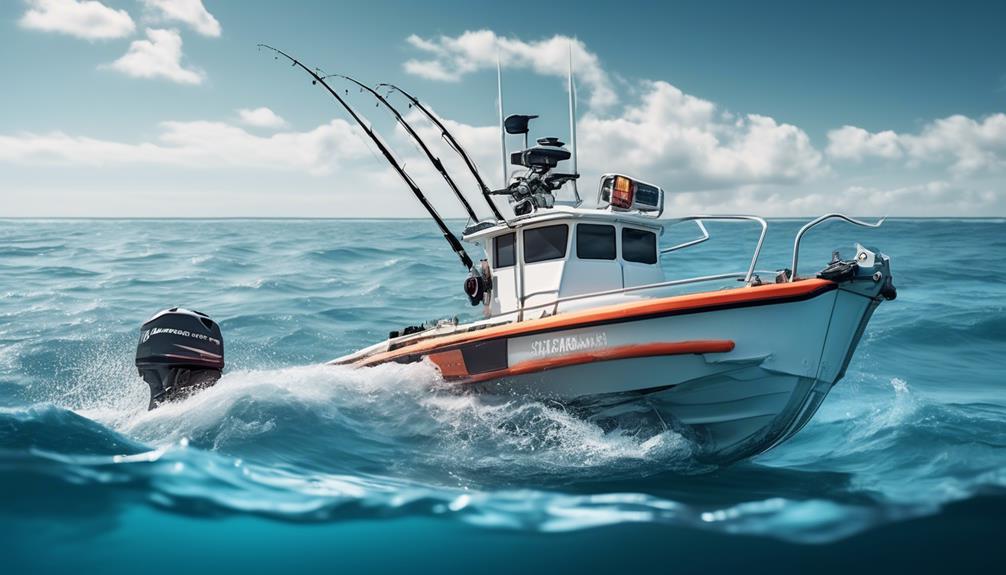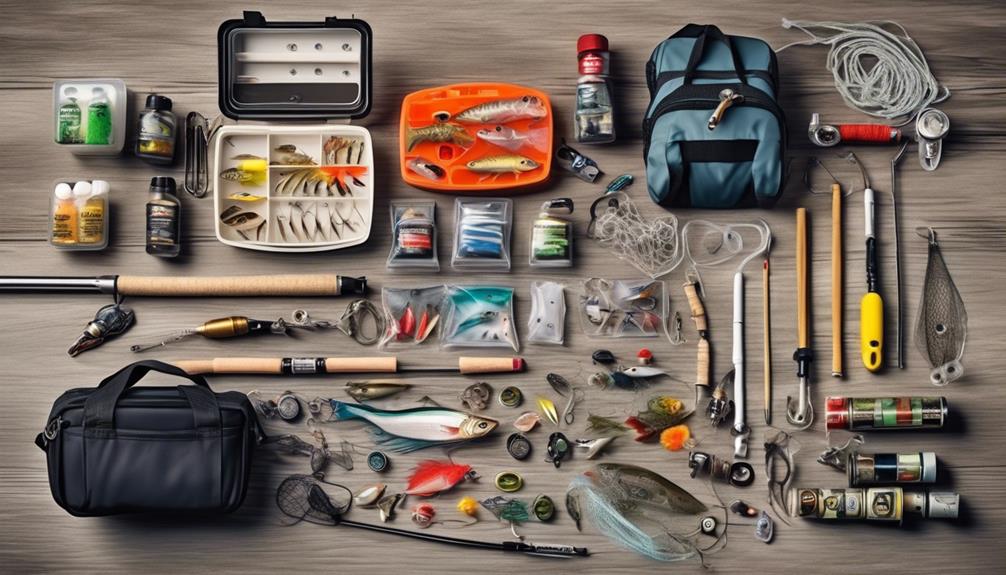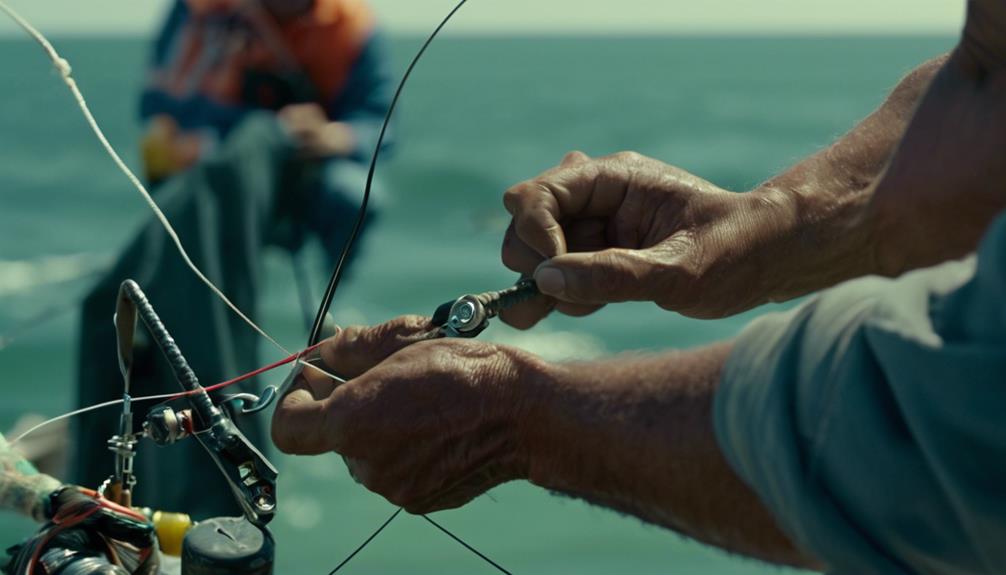When it comes to saltwater fishing, did you know that over 11 million Americans participate in this activity each year?
Whether you're a seasoned angler or just getting started, having the right gear is essential for a successful and enjoyable fishing trip.
From rods and reels to safety and navigation equipment, the list of essential gear can seem overwhelming.
But fear not, we're here to help you navigate through the must-have items for your next saltwater fishing adventure.
So, let's dive into the world of saltwater fishing gear and ensure you're well-prepared for your next outing.
Rods and Reels
When selecting rods and reels for saltwater fishing, consider the weight and strength of the equipment to ensure it can handle the larger, more powerful fish found in these environments. Proper maintenance of your rods and reels is essential to prolong their lifespan and ensure optimal performance. After each fishing trip, rinse your equipment with fresh water to remove salt and debris, and lubricate the reels to prevent corrosion. Store your rods and reels in a cool, dry place to prevent rust and damage. Regularly check for any signs of wear and tear, and address any issues immediately to avoid problems during your next fishing excursion.
Choosing the right size for your rods and reels is crucial for successful saltwater fishing. Opt for a rod that's sturdy and capable of handling the weight of larger fish. Look for reels with a high line capacity and a strong drag system to tackle the powerful runs of saltwater species. Consider the type of fishing you'll be doing – whether it's surf fishing, deep-sea fishing, or inshore fishing – and select your equipment accordingly. Match the rod and reel sizes to the specific species you target and the techniques you plan to use.
Lines and Leaders
Selecting the right lines and leaders is crucial for saltwater fishing success, ensuring strength and durability to handle the challenges of the marine environment.
When it comes to saltwater fishing, knot tying is an essential skill. You need to ensure that your knots are strong and reliable, capable of withstanding the intense pressure that comes with reeling in large, powerful fish. Practice tying strong knots like the Palomar knot, Uni knot, and Improved Clinch knot to secure your line to the hook, swivel, or leader.
Regular line maintenance is also key to successful saltwater fishing. After each trip, carefully inspect your line for any signs of wear and tear, such as nicks or fraying. Replace any compromised sections to prevent break-offs when battling aggressive saltwater species.
Additionally, make it a habit to clean your reels and spool fresh line regularly to prevent corrosion and ensure smooth casting and retrieval. Proper line maintenance will extend the life of your fishing line and prevent unexpected failures when fighting powerful saltwater gamefish.
Hooks and Rigs
To enhance your saltwater fishing success, ensure that your hooks and rigs are tailored to the specific species you're targeting and the techniques you'll be using. Properly selected hooks and rigs can make a significant difference in your fishing experience, increasing your chances of a successful catch.
Here are some essential tips to consider for hooks and rigs:
- Knot Tying: Mastering the art of tying different knots is crucial for securing your hooks and rigs effectively. Whether it's the improved clinch knot for tying your hook to the line or the loop knot for allowing your bait to move naturally, understanding and practicing various knot-tying techniques will greatly enhance your fishing experience. A secure knot ensures that you won't lose your prized catch due to a weak connection.
- Bait Presentation: The way your bait is presented can greatly influence your success in saltwater fishing. Proper rigging techniques, such as using a Carolina rig for bottom fishing or a popping cork rig for surface bait presentation, can attract the attention of your target species. Experimenting with different rigs and understanding how they affect bait movement and visibility can significantly improve your chances of a successful catch.
- Hook Selection: Choosing the right hook size and type is crucial for targeting specific saltwater species. From circle hooks for catch-and-release fishing to J-hooks for natural bait presentation, understanding the behavior and feeding habits of your target fish will help you select the most appropriate hooks for your saltwater fishing expedition.
Lures and Baits
Mastering the art of presenting your bait effectively can greatly enhance your saltwater fishing success, and now we'll explore the subtopic of 'Lures and Baits'.
When it comes to saltwater fishing, having the right lures and baits can make a significant difference in your catch. There are various types of lures and artificial baits that you can use to attract different species of fish. Some popular types of lures include topwater lures, soft plastic lures, and metal jigs. Each type is designed to mimic different types of prey, and experimenting with various lures can help you figure out what works best in different conditions.
In addition to artificial baits, live bait options are also essential for saltwater fishing. Depending on the target species, live bait such as shrimp, mullet, sardines, and squid can be highly effective. Proper bait presentation is crucial, as it can make the difference between a successful catch and a missed opportunity. This includes techniques such as free-lining bait, using a bobber to keep the bait at a certain depth, or adding weight to the line to keep the bait closer to the bottom.
Tackle Boxes and Bags
Keeping your fishing gear organized and easily accessible is essential for a successful day on the water. Tackle boxes and bags are crucial for storing and transporting your fishing equipment. Here are some tips and options to consider:
- Organization Tips
When choosing a tackle box or bag, look for one with multiple compartments and adjustable dividers. This allows you to customize the storage space according to your needs. Sort your lures, hooks, sinkers, and other tackle by type and size to make them easier to find when you need them. Additionally, consider using small containers or resealable bags within your tackle box to further organize and protect your gear.
- Waterproof Options
Saltwater fishing often involves exposure to water, so it's important to invest in a waterproof tackle box or bag. Look for products made from durable, waterproof materials to keep your gear dry and rust-free. Sealable compartments and waterproof zippers are also beneficial features to prevent water from seeping into your tackle box.
- Portability
Consider the size and portability of the tackle box or bag. If you plan to fish from a boat, a larger tackle box may be suitable, but for shore fishing or wading, a more compact and lightweight option might be preferable for easy transport.
Clothing and Footwear
When preparing for saltwater fishing, it's essential to choose clothing and footwear that provide protection and comfort in the marine environment.
Sun protection is crucial, so opt for clothing with UPF (Ultraviolet Protection Factor) features to shield your skin from harmful UV rays. Lightweight, long-sleeved shirts and pants made from quick-drying, breathable materials offer both sun protection and comfort. Don't forget a wide-brimmed hat and polarized sunglasses to further safeguard yourself from the sun's glare reflecting off the water.
Given the wet conditions, waterproof footwear is a must. Look for durable, quick-drying shoes or boots with non-slip soles to prevent slipping on wet decks. Water-resistant sandals or deck shoes are ideal for warm weather, while rubber boots are essential for colder, wetter conditions. Comfort is key when spending long hours at sea, so choose moisture-wicking socks to keep your feet dry and prevent blisters.
In terms of durability, select clothing and footwear designed to withstand saltwater exposure. Look for corrosion-resistant materials and reinforced stitching to ensure your gear holds up in the harsh marine environment. Additionally, consider investing in quality, water-resistant outer layers to stay dry in inclement weather.
Safety and Navigation Equipment

To ensure your safety and navigation in the marine environment, it's crucial to have the right equipment, including life jackets and GPS devices. When heading out for saltwater fishing, safety should be a top priority. Here are some essential safety equipment and navigation tools you should consider bringing with you:
- Life Jackets: Life jackets are a vital piece of safety equipment for any saltwater fishing trip. Accidents can happen unexpectedly, and wearing a life jacket can save your life in case of a fall overboard or a boat capsizing. Ensure that you have enough Coast Guard-approved life jackets for everyone on board the vessel.
- GPS Devices: Global Positioning System (GPS) devices are indispensable tools for navigating the open waters. They provide accurate information about your location, speed, and direction, helping you to navigate safely and efficiently. In addition to standalone GPS devices, many modern fish finders also come equipped with GPS functionality, making them dual-purpose tools for finding fish and keeping track of your position.
- Emergency Signaling Equipment: In case of an emergency, having signaling equipment such as flares, a whistle, or a signal mirror can be crucial for alerting nearby vessels or rescue teams to your location. These items can significantly improve your chances of being quickly located and assisted in the event of an emergency.
Maintenance and Accessories
Regularly inspecting and maintaining your fishing gear is essential to ensure optimal performance and longevity. Saltwater fishing exposes your gear to harsh conditions, making maintenance crucial. Cleaning tools are a must-have for saltwater anglers. Rinse your rods, reels, and other equipment with freshwater after each use to remove salt and sand, and use a mild soap to eliminate any stubborn residue. Additionally, invest in corrosion prevention products such as lubricants and rust inhibitors to protect metal parts from the corrosive effects of saltwater.
Rod holders are indispensable for saltwater fishing. They keep your rods secure and accessible, preventing them from getting tangled or damaged on the deck of the boat. Whether you opt for flush-mounted, clamp-on, or adjustable rod holders, ensure they're made of corrosion-resistant materials suitable for the marine environment.
Furthermore, fishing carts can be incredibly useful for transporting gear, bait, and catch to and from your fishing spot. Look for carts with large, durable wheels designed to handle sandy and uneven terrain commonly found near the shore.
In addition to these accessories, consider investing in a good quality tackle storage system to keep your lures, hooks, and other tackle organized and readily available. By incorporating these maintenance and accessories into your saltwater fishing arsenal, you can ensure that your gear remains in top condition, prolonging its lifespan and enhancing your overall fishing experience.
Frequently Asked Questions
What Are the Best Types of Sunglasses for Saltwater Fishing and How Do They Protect Your Eyes?
When fishing in saltwater, polarized sunglasses with UV protection are essential for your eyes. They prevent eye strain, reduce glare, and come in different lens color options. Ensure you choose a pair that suits your needs.
How Can I Properly Clean and Maintain My Fishing Reels to Ensure They Last a Long Time?
To ensure your fishing reels last a long time, proper maintenance is key. Regularly clean your reels using reel cleaning techniques like disassembling, cleaning with a solvent, and re-lubricating. This will help prevent corrosion and extend their lifespan.
What Types of Electronic Devices or Gadgets Are Useful for Navigation and Finding Fish in Saltwater?
When fishing in saltwater, sonar technology and GPS devices are essential for navigation and finding fish. Sonar helps locate fish, while GPS devices aid in chart plotting, ensuring you can navigate and find the best fishing spots.
Are There Any Specific Types of Gloves That Are Recommended for Handling Fish and Protecting Against the Sun and Saltwater?
For sun protection while handling fish in saltwater, it's essential to use gloves. Look for UV-resistant, quick-drying gloves that offer hand protection from the sun and saltwater. They'll also provide grip and prevent cuts.
What Are Some Important Safety Considerations When Fishing in Saltwater, Such as Dealing With Strong Currents or Potential Wildlife Encounters?
When fishing in saltwater, dealing with strong currents is important for safety. Be aware of potential wildlife encounters, like sharks or jellyfish. Always keep a lookout and have a plan in case of emergencies.
Conclusion
Now that you have all the essential gear for saltwater fishing, you're ready to hit the water and reel in some big catches. Make sure to stay safe, keep an eye on the weather, and maintain your equipment for a successful and enjoyable fishing trip.
Remember to always pack your tackle box with the right lures and baits, and don't forget to wear appropriate clothing and footwear for a comfortable and productive day on the water.
Happy fishing!



